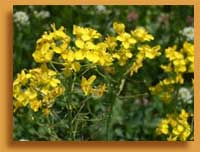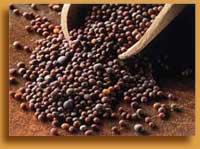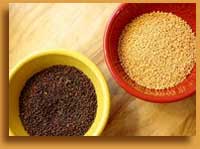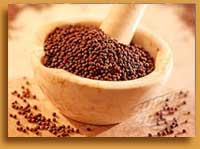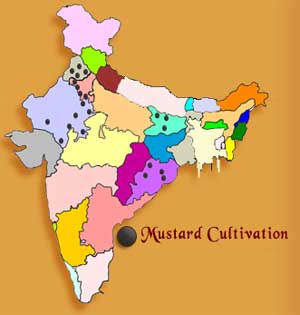MUSTARD
Introduction
Mustard is a yearly herb grown in India as an oil seed crop or as a vegetable or as fodder, of which, three varieties are known for its condiment value. They are watery yellow or white mustard also known as Brassica hirta, brown mustard also known as Brassica juncea and black mustard also known as Brassica nigra. The leaves of the plant are alternating, lengthy, stubbly branched, petiolate, covered with hair on both sides. Flowers are small, yellow with four petals, cruciform. Seeds are 1.5-3mm in length.
Common Names
Brassica juncea (L.) Czern. and Coss is the scientific biological name of the mustard plant, In the regional Indian languages of India,ie., in Hindi it is called as Rai, Banarasi rai, Kalee sarson, in Gujarati it is called as Rai, in Kannada it is called as Sasave, in Kashmiri it is called as Aasur, Sorisa, in Malayalam it is called as Kaduku, in Punjabi it is called as Rai, Banarasi rai, Kalee sarson, in Sanskrit it is called as Asuri, Bimbata, in Tamil it is called as Kadugu, in Telugu it is called as Avalu and in Urdu it is called as Rai, Banarasi rai, Kalee sarson.
Parts of the plant used
Mustard plant is one of the numerous plants containing seeds that are used as a condiment. Seeds of the mustard plant are very much used in cooking. Mustard paste or sauce prepared from mustard seeds are also used as a condiment. Mustard greens are edible leaves from a diversity of mustard plant. Mustard plaster is a traditional medical management used to take care of minor ailments, made from mustard seed powder. Mustard and cress, a combination of mustard seeds and garden seeds cultivated as sprouts is used as a sandwich filling or as a garnish for salad or other dishes.
History
The initial reference to mustard is in India from a story of Gautama Siddhartha in the 5th century BCE. Gautama Buddha narrated the story of the grieving mother known as Kisa Gotami and the mustard seed. When a mother loses her single son, she takes his dead body to Buddha to find a cure. The Buddha asks her to fetch a handful of mustard seeds from a family unit that has never lost a kid, spouse, parent or companion. When the mother is not able to find such a house in her village, she realizes that death is universal to all, and she cannot be selfish in her sorrow.
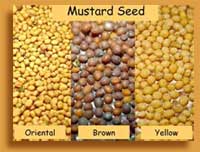
The Buddha acknowledged that if a person were to pick a single mustard seed each hundred years from a seven-mile cube full of mustard seeds, then by the time the final seed is picked, the age of the earth cycle would still go on. If a mustard seed is 3 mm in diameter, then picking one seed each 100 years from a seven-mile cube of seeds, would acquire 936 quintillion years, 68 billion times the age of the universe. The French have been using mustard seeds as a spice ever since 800 AD, and it was amongst the spices taken by the Spanish on explorations the whole time of the fifteenth century.
In the Quran, it is affirmed that the scales of impartiality will be established on the Day of Judgement, and no soul will experience the least discrimination. Even the equivalent of a mustard seed will be taken into account for because God is the most proficient reckoner. Jewish text contrast the predictable universe to the size of a mustard seed to demonstrate the earth's irrelevance and to teach humility.The Jewish philosopher, Nahmanides, maintains that the universe has been expanding from the time of its creation, in which it was the size of a mustard seed. In the Christian original testimony, the mustard seed is used by Jesus in the parable of the mustard seed as a replica for the kingdom of God which originally starts little but grows to be the largest of all garden plants. Faith has also been spoken regarding the perspective of a mustard seed.
Cultivation Of Mustard
Mustard seeds normally take three to ten days to sprout if positioned underneath the appropriate conditions, which comprises a chilly atmosphere and comparatively damp soil. Mature mustard plants develop into shrubs. Mustard grows well in pleasant regions. Chief producers of mustard seeds are Canada, Hungary, Great Britain, India, Pakistan and the United States. Brown and black mustard seeds give back greater yields than their yellow counterparts. In Pakistan, rapeseed-mustard is the next main significant source of oil, after cotton.
It is grown over an area of 307,000 hectares with an annual production of 233,000 tonnes and contributes about 17% to the domestic production of edible oil. The mustard seed is a wealthy resource of oil and protein. The seed has oil has 46-48 percent, whole seed meal contains 43.6 percent protein. It is cultivated as a rabbi crop in North India. It is grown during the rainy season from July to November in South India.
Uses
Cooking
Mustard is regularly used at the table as a condiment with meat. It is also used as an element in mayonnaise, vinaigrette, marinades, and barbecue sauce. It can also be used as a support for salad dressing, when mixed with vinegar and olive oil. Mustard is an all the rage supplement for hot dogs, pretzels, and bratwurst. Mustard as an emulsifier which can alleviate a mixture of two or supplementary immiscible liquids, such as oil and water. When supplemented to Hollandaise sauce, mustard can decrease the risk of curdling. Dry mustard, characteristically sold in cans, is used in cooking and can be assorted with water to become all set mustard.
Medicine
Mustard has been used medicinally since the time of the Greek physician Hippocrates. The Romans ate the whole seed as a spice during meals, but mustard was not milled for use at the table until the eighteenth century. Mustard contains an essential oil known as allyl isothiocyanate which when applied to the outside of the body, increases the circulation and so helps the elimination of toxic wastes. This makes it of a great value in treating a number of complaints, from a simple chill to rheumatism.
Externally, mustard is often applied as a poultice or pack for example, to ease bronchitis, neuralgia or toothache but it is also available as an ointment. Mustard ointment has long been marketed in Britain and is recommended to ease the pain of unbroken Chilblains. Two or three tablespoons of mustard powder can be used in the bath to Ease chill and to relax tired muscles and promote sleep. Aching feet can also benefit from a foot bath (one tablespoon) and it has been found very beneficial when chill to remain hot.
Mustard Cultivation in India
